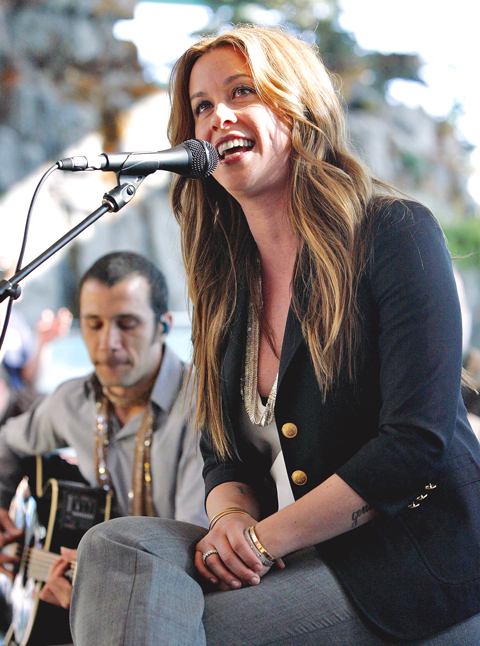Thirteen years on, it is easy to forget just how much of a phenomenon Alanis Morissette’s first major album, Jagged Little Pill, proved to be — particularly among women. With its immortal lyric, “D’you still think of me when you fuck her?” ringing around the bedrooms of angst-ridden teenagers (and often those of their mothers too), the album became the second-biggest seller of the 1990s. It was assumed that Morissette would go on to write more pithy, angry songs about relationships — instead, she took 18 months off to travel around India with her friends, and returned to record music that even she, at times, has called “amazingly self-indulgent.”
So it is good to see the return of some of that early anger on her new album, Flavors of Entanglement. While writing it, she split up with her longtime fiance, the Canadian actor Ryan Reynolds, an aspiring A-lister who is now engaged to Scarlett Johansson. She says that “this album was like a life raft ... . I wanted my own personal story to unfold as it was happening.” As such, it is effectively a breakup album, moving from fury to hedonist escape to hope, and featuring some fantastically barbed lyrics. On the grinding, juddering track Straitjacket, for instance, she castigates her ex-lover, “I don’t know who you are, talking to me with such fucking disrespect,” while on Underneath she sings, “Look at us break our bonds in this kitchen/Look at us rallying our defenses/Look at us waging war in our bedroom.” It is a raw evocation of the loss of someone she had expected to build a life with.
We meet in a hotel in London, and, at 33, Morissette looks rounder and more beautiful than the tomboy I first interviewed back in 1996. On her fifth major album, she feels that she has come full circle. “What’s that line from T.S. Eliot? To arrive at the place where you started, but to know it for the first time. I’m able to write about a breakup from a different place. Same brokenness. Same rock-bottom. But a little more informed, now I’m older. Thank God for growing up,” she adds.

PHOTO: EPA
Morissette is more approachable than most well-known artists, and laughingly admits that she has a problem “setting boundaries.” When young women come up to her, as they regularly do, wanting to tell their stories about suicide attempts, divorce, body image and parental death, she can’t bring herself to back away.
It is partly this that has inspired her other current project, a memoir focusing on women’s issues. She is halfway through writing it, and has chapters on themes such as sexuality, beauty, relationships and work. Those themes underline the fact that for years Morissette has struggled with low self-esteem. Growing up in “a chauvinistic, patriarchal environment” in Ontario, with her Hungarian/French-Canadian family, she was an established actor and pop star from an early age, and spent the late 1980s singing bland dance pop from beneath a frosted fringe, feeling as if she was “14 going on 40.” In fact, the pressure was so great that at 16 she became anorexic and bulimic.
One day, a record executive summoned her to the studio and “suggested I was getting too fat, saying, ‘You need to go on a diet.’ My response was, ‘But I’m a singer.’ He said, ‘Yes, well, you need to get small again.’ That started a whole cycle. Two days later I was sticking my fingers down my throat.”

PHOTO: EPA
She feels that the pressure and obsession with body image is one of the key issues facing women today. “Europe seems a little softer,” she says, “but in America it’s harsh. In LA, where I live, it’s all about perfectionism. Beauty is now defined by your bones sticking out of your decolletage. For that to be the standard is really perilous for women.”
Does she see herself as a feminist? “What’s your definition?” she asks. Equal pay. Equal rights. That women should be able to fulfill their potential regardless of gender. “If that’s what the definition is, then yes, absolutely ... . Women are so powerful they’re scary, and the incentive to squash this has been going on for so long that some of us actually believe we’re subordinate.”
Morissette was 19 when she left Ontario and gave up trying to be “Miss Perfect.” She ended up in Los Angeles, working with rock producer Glen Ballard, who encouraged her to free-associate, and to bring out her unfettered, unruly side in her lyrics. Madonna signed her up to her Maverick label, and Jagged Little Pill followed.
Although passion coursed through the record, Morissette has been accused, repeatedly, of being a puppet for male producers. Her response was to “over-function,” to micromanage each video and record, and to produce herself.
“Now I see the futility in that,” she says. “I’m still empowered, but it’s lovely to let the producer or director work without trying to control the whole situation.” Tori Amos recently suggested that it is almost impossible to have real independence as a female artist on a major label — “You’re accepted up until the point you want to be your own producer and have your own label, and then things close down,” she said — and Morissette agrees that executives often balk at her independence. “It’s such a common, daily thing I don’t even notice it any more,” she says. “It’s scary for them, especially if there’s money involved. I’m a liability to them — I’m a woman, I’m empowered, I’m an artist. I’ve had executives who can’t come to my shows they’re so scared of me. I’ve been a thorn in many people’s sides just by existing.”
Did going to India make her lose her rage? “No. I felt gratitude. Humility. My rage showed up in other ways. I’m always fascinated by how people’s rage shows up. Canada has a passive-aggressive culture, with a lot of sarcasm and righteousness. That went with my weird messianic complex. The ego is a fascinating monster. I was taught from a young age that I had to serve, so that turned into me thinking I had to save the planet.”
This was reflected in the role she played in Kevin Smith’s 1999 comedy, Dogma, a satire on the Catholic church: Morissette was cast as God. Now she doesn’t feel the need to save the world, or be approved of. “I highly recommend getting older! There’s less tendency to people-please.” Just one look at My Humps, the spoof video she put up on YouTube last year as a retort to the rap act Black Eyed Peas shows how relaxed and confident she has become. In the video, she ridicules the notion of women as doe-eyed sexual decorations, turning the tables with her comic domination of some male backing dancers.
Does she think the industry has become easier for female stars in recent years, or has the intrusive tabloid focus on the public breakdowns of Britney Spears and Amy Winehouse, for instance, made it harder?
“In terms of exposure, there’s never been a better time,” she says. “You can throw things up on YouTube, and release music via the Internet. But fame is tough to navigate when your relationship with yourself is still healing, and the rupture is festering and bleeding in public. I feel compassionate towards women like Britney and Amy. But they’re big girls. They’ll get through it. And they wanted it to a certain extent. This fame thing is something you can stay out of if you want to.”
Morissette recognizes that in the fickle world of pop, an artist’s strongest asset is her music — songs that will move people long after the image fades. “That’s what I keep coming back to. Is what you’re writing who you are, what you really want to be doing?” she says. “That’s all that matters.”

April 14 to April 20 In March 1947, Sising Katadrepan urged the government to drop the “high mountain people” (高山族) designation for Indigenous Taiwanese and refer to them as “Taiwan people” (台灣族). He considered the term derogatory, arguing that it made them sound like animals. The Taiwan Provincial Government agreed to stop using the term, stating that Indigenous Taiwanese suffered all sorts of discrimination and oppression under the Japanese and were forced to live in the mountains as outsiders to society. Now, under the new regime, they would be seen as equals, thus they should be henceforth

Last week, the the National Immigration Agency (NIA) told the legislature that more than 10,000 naturalized Taiwanese citizens from the People’s Republic of China (PRC) risked having their citizenship revoked if they failed to provide proof that they had renounced their Chinese household registration within the next three months. Renunciation is required under the Act Governing Relations Between the People of the Taiwan Area and the Mainland Area (臺灣地區與大陸地區人民關係條例), as amended in 2004, though it was only a legal requirement after 2000. Prior to that, it had been only an administrative requirement since the Nationality Act (國籍法) was established in

With over 80 works on display, this is Louise Bourgeois’ first solo show in Taiwan. Visitors are invited to traverse her world of love and hate, vengeance and acceptance, trauma and reconciliation. Dominating the entrance, the nine-foot-tall Crouching Spider (2003) greets visitors. The creature looms behind the glass facade, symbolic protector and gatekeeper to the intimate journey ahead. Bourgeois, best known for her giant spider sculptures, is one of the most influential artist of the twentieth century. Blending vulnerability and defiance through themes of sexuality, trauma and identity, her work reshaped the landscape of contemporary art with fearless honesty. “People are influenced by

Three big changes have transformed the landscape of Taiwan’s local patronage factions: Increasing Democratic Progressive Party (DPP) involvement, rising new factions and the Chinese Nationalist Party’s (KMT) significantly weakened control. GREEN FACTIONS It is said that “south of the Zhuoshui River (濁水溪), there is no blue-green divide,” meaning that from Yunlin County south there is no difference between KMT and DPP politicians. This is not always true, but there is more than a grain of truth to it. Traditionally, DPP factions are viewed as national entities, with their primary function to secure plum positions in the party and government. This is not unusual